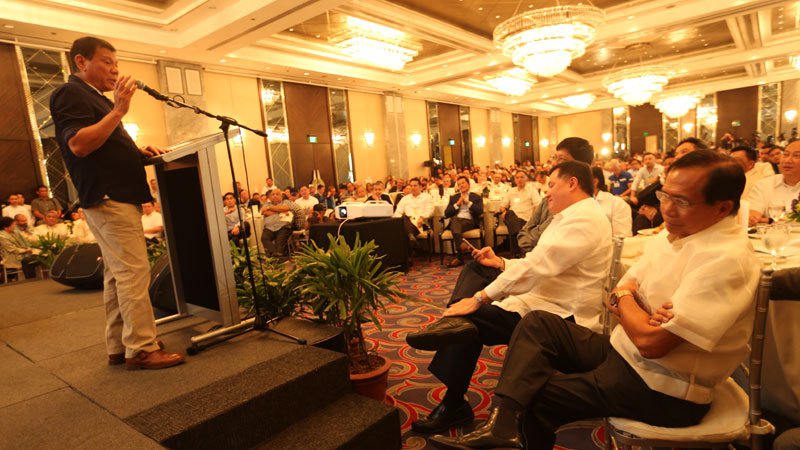His economic agenda

Presidential candidate Davao Mayor Rodrigo Duterte delivers his speech during the Makati Business Club forum held at Manila Peninsula in Makati City. EDWIN BACASMAS
WHEN Rodrigo Duterte was campaigning for the highest post of the land, a big concern in the business community was his lack of an economic program. He ran—and won—mainly on the promise to address the peace and order situation and solve gut issues neglected by the Aquino administration, such as the horrendous traffic situation in the metropolis.
Last week, a broad outline of the incoming administration’s economic program came to light, to the delight of the business community. Duterte’s transition team presented an eight-point economic agenda focusing on investments, infrastructure, tax reforms, social services and rural development.
It was a bit of good news. An important highlight of the announcement to calm fears in the business community is that the presumptive President will continue and maintain the country’s current macroeconomic policy. No doubt, the Aquino administration takes credit for a sustained expansion in gross domestic product averaging a decades-high 6.2 percent anchored on a stable fiscal and monetary regime.
For ordinary wage-earners and corporate taxpayers, the good news is that the incoming administration is planning to lower income tax rates to 25 percent from the current 32 percent, which is among the highest in the region. As one of Duterte’s economic advisers pointed out, the Philippines needs to align its tax system with those of other members of the Asean to be competitive. Investors will not come if they perceive that the tax system here is too punishing.
This makes sense, as one of the economic thrusts of the Duterte administration is to make the investment climate more attractive to foreign investors. The plan is to ease economic restrictions to the entry of foreign direct investments. Currently, foreigners are barred by the Constitution from investing in certain industries reserved for Filipinos or restricted to owning no more than 40 percent in other sectors. Relaxing these restrictions had long been suggested by various business organizations, which contend that opening more sectors to foreign investors will hopefully bring an end to inefficient or underperforming monopolies in the industries.
Ease of doing business, another common complaint especially from those dealing with local government units for their various permits, is also high on Duterte’s agenda. The plan is for the national government to follow the “Davao model,” where licenses needed to start and operate a business are issued in the shortest possible time. It promises a regime in which the government will actually help investors put up businesses instead of being a hindrance.
Also on the agenda is the plan to develop the rural areas, basically the agriculture sector, by providing support services to small farmers to improve their productivity. The new regime will encourage more investors to put up processing businesses in the agricultural areas. Promoting tourism in the rural areas will also be a focus in the incoming administration. So is the strengthening of the basic education system and the provision of scholarships for tertiary education, which, Duterte’s team believes, is relevant to the needs of the private sector, or matching what is taught with what is demanded in the field.
Other aspects of Duterte’s economic agenda involve the continuation of two pillars of President Aquino’s administration—the slow-to-start public-private partnership program and the hugely successful conditional cash transfer program more popularly known as the Pantawid Pamilyang Pilipino Program.
Among the names floated as possible members of the Duterte Cabinet, one stands out as far as the business community is concerned: Carlos Dominguez, a member of the Duterte transition team and former Cabinet secretary during the administrations of Presidents Corazon Aquino and Fidel Ramos. The incoming administration has yet to formally name its economic managers, or those who will hold the trade and industry, finance, public works, energy, budget and economic planning portfolios. It is hoped that Duterte will carefully deliberate on those being suggested to head these agencies. The people he will name to these posts will largely determine the success of his economic agenda. They should at least be well-respected and have good track records.
In the end, the Duterte presidency will only be as good as the people who will serve it.




















